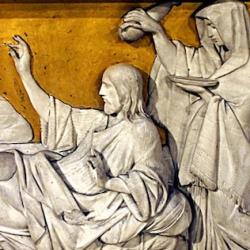For the next several weeks, I will be picking up where I left off in Matthew, in chapter 24, the “Olivet Discourse.” I will take the position that Jesus’ prophecy is not about the end of the world or His final coming, but about the destruction of the Old Covenant that took place in A.D. 70.
When Christians first hear this, they begin to worry: If the events Jesus predicts already took place nearly 2000 years ago, isn’t this passage just a piece of ancient Jewish history? What value does it have?
As Paul would say: Much in every way.
The Olivet Discourse is not unique in this respect. If we wanted to, we could dismiss the whole Bible as nothing more than “ancient Jewish history,” of interest only to historians who specialize in quaint curiosities.
Yet, all Scripture is useful in making us wise. Scripture records events that took place once for all, but primarily Scripture reveals the God who is the same yesterday, today, and forever. He uses the same steps over and over, and by absorbing Scripture we become skilful partners in the dance of history.
In Matthew 24, Jesus is talking about the destruction of a first-century political and liturgical system, but God has built other houses since. The holy Roman empire was such a house, and so was the medieval church, and so are the nation-state, the American empire, the Protestant churches. Trinity Reformed Church is such a house, and so are your own life, family, business.
Jesus applies this prophecy quite directly to us at the end of the sermon on the mount: “ everyone who hears these sayings of Mine, and does not do them, will be like a foolish man who built his house on the sand: and the rain descended, the floods came, and the winds blew and beat on that house; and it fell. And great was its fall. ” If we want our house to stand, we must confess our disobedience and turn from it.











